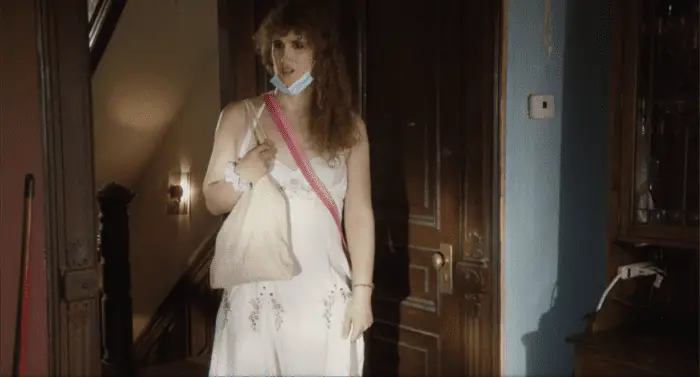If I had a dollar for every semi-autobiographical movie I’d reviewed about the creative struggles and dysfunctional relationships of queer middle-class hipsters living in New York city, then that would be the most money I’d ever made off my reviewing. Throw a rock at any film festival and you’ll hit someone selling a film that passably fits that synopsis. I understand the old axiom of “write what you know” but exercise too little creative license and audiences might struggle to pick your film out of a lineup. Stress Positions, the feature film debut of director, composer and star Theda Hammel is actually one of the more original and artistic films to fit under that banner, thanks in no small part to its acknowledgement of how awful and ignorant its characters are, and its understanding that that doesn’t mean they can’t provide some foolish wisdom on occasion.
Stress Positions doesn’t ask you to fall in love with its cast of self-absorbed layabouts, but to observe them and learn what you can. As the interior monologue of its Moroccan-American protagonist Bahlul (Qaher Harhash) reflects on his mother’s lessons about the selfish, lustful nature of Americans, we see Karla (Hammel herself) eyeing him up, pocketing a bottle of liquor and helping herself to a premature taste of his birthday cake. It’s a revealing moment, as despite playing Karla, we suspect Hammel’s own self-insert is actually Bahlul, and it’s through him that we are witnessing an account of her coming of age, or rather, she is both individuals, who trade off the role of narrator throughout the film.
But I’m getting ahead of myself, the explicit premise of Stress Positions centers on the neurotic Terry (John Early) who’s experience of the 2020 lockdown was kicked off by his philandering overgrown party-boy husband Leo (John Roberts) serving him divorce papers, and he has retreated into the run-down three story townhouse Leo kept for his affairs. Whereupon his seclusion is interrupted by the arrival of his nephew Bahlul, the attractive son of a puritanical religious sister who has disowned them both for their femininity, and who now needs somewhere to recover from a broken leg. Bahlul’s presence has set tongues wagging throughout Terry’s friendship circle, as the free-spirited and lustful Karla is desperate to meet the exotic young model Terry has convalescing in his basement. Add to this cast of colorful, quirky characters, Coco (Rebecca E. Wright) the strange voyeur living in the attic room, a laid-back, sexually adventurous delivery driver (Farheem Ali) and Vanessa (Amy Zimmer), Karla’s high-strung and untalented novelist partner.

It’s a chaotic assemblage of characters, and sometimes the film has them interact in ways that are more farcical than funny, but the richer scenes that invest heavier in the dialogue and imagery can provide revealing and unexpected dimensions to them all, none more so than Bahlul who by the film’s end, has taken center stage as its unexpected heart and soul. The film’s most poignant running thread lies in his recollections of the time spent travelling with his judgmental mother and the complex relationship it left him with towards his surroundings. He’s consistently the most likable and charitable character, with the film seeing in him a sensitive, wounded soul on a journey of self discovery, where the other characters usually just see him as a handsome young body with a naive and potentially receptive owner.
The film invites debate about gender and sexuality through a genuinely provocative and candid expression of self, one that refuses to cater to narratives that might be useful when the trans community is under such fervent and organised attack. One might well accuse Hammel’s refusal to dilute her own experiences as an expression of pure privilege that could potentially be harmful to those trans women who do not benefit similarly. But within its niche, it’s refreshing to see someone speak from among the persecuted with such little apology for their own flaws and I’d be wary of policing how trans women are allowed to portray themselves. Coming of age is tough for all of us but especially those coming into not just a new phase of life, but a new gender as well. In Karla we see someone who has become so indifferent to other people’s judgement, that she’s become genuinely reckless, self-destructive and inconsiderate. She’s still wiser and more self-aware than most characters here though, these are wealthy 20-something New Yorkers after all, and aside from Ronald the delivery driver and Bahlul’s modelling gig, none of them seem to actually have jobs. It’s a canny and unrepentant characterization and could well have come off cynical were it not for the sensitivity that pervades the film.

It’s certainly an evocative portrait of that strange, unstable summer of 2020 where germs and revolution co-mingled in the air, and none of use were ever more aware of our own idleness, fragility and privilege, unless you were one of the ones actually on the street being tear-gassed for trying to hold the police to account (the BLM protests where I live were a lot safer). The protests come up in Stress Positions but the cause is never acknowledged. For this privileged little bubble, protest is just a performative aesthetic: on July 4th, Karla burns a flag for her 90 followers on TikTok.
Stress Positions isn’t the most hilarious or incisive film you’ll ever have seen, but it is an eerie time capsule and genuinely provocative, poignant and subversive. It might feel wearisome and laboured if you’re expecting something more purely frivolous and escapist—its attempts at farce do rarely come off—or something with a clear and concise meaning, but if approached with a spirit of empathy mixed with genuine intellectual curiosity, Stress Positions might well beguile you.




